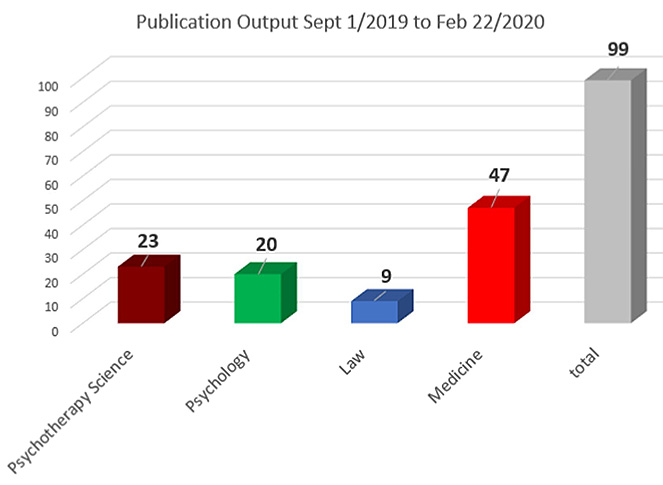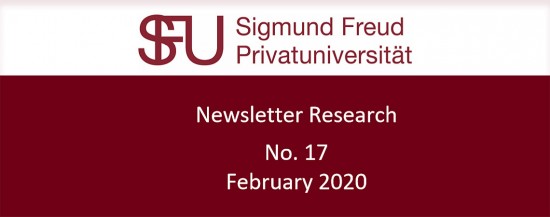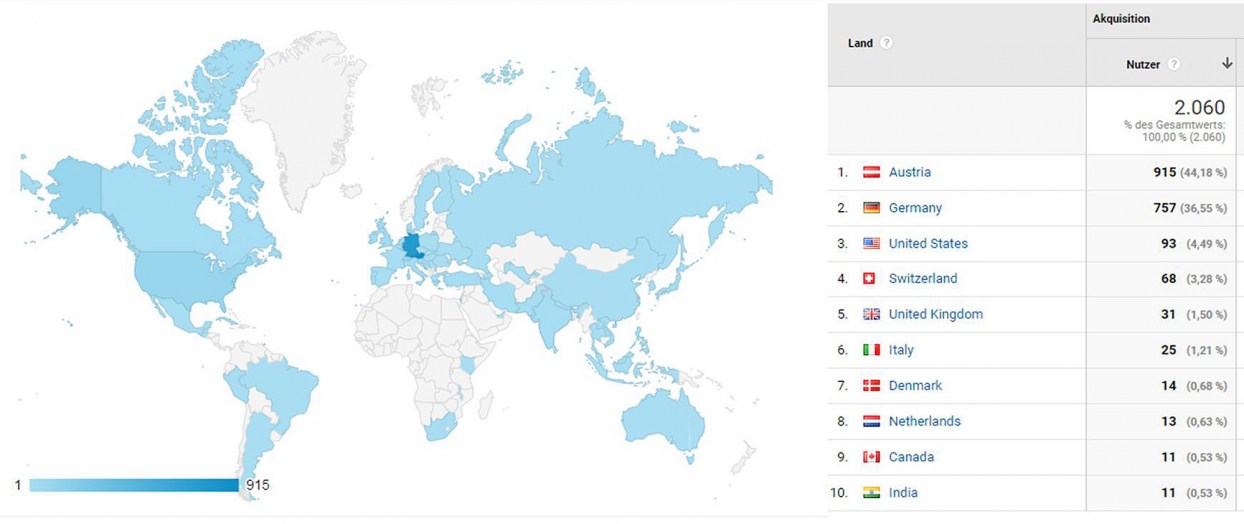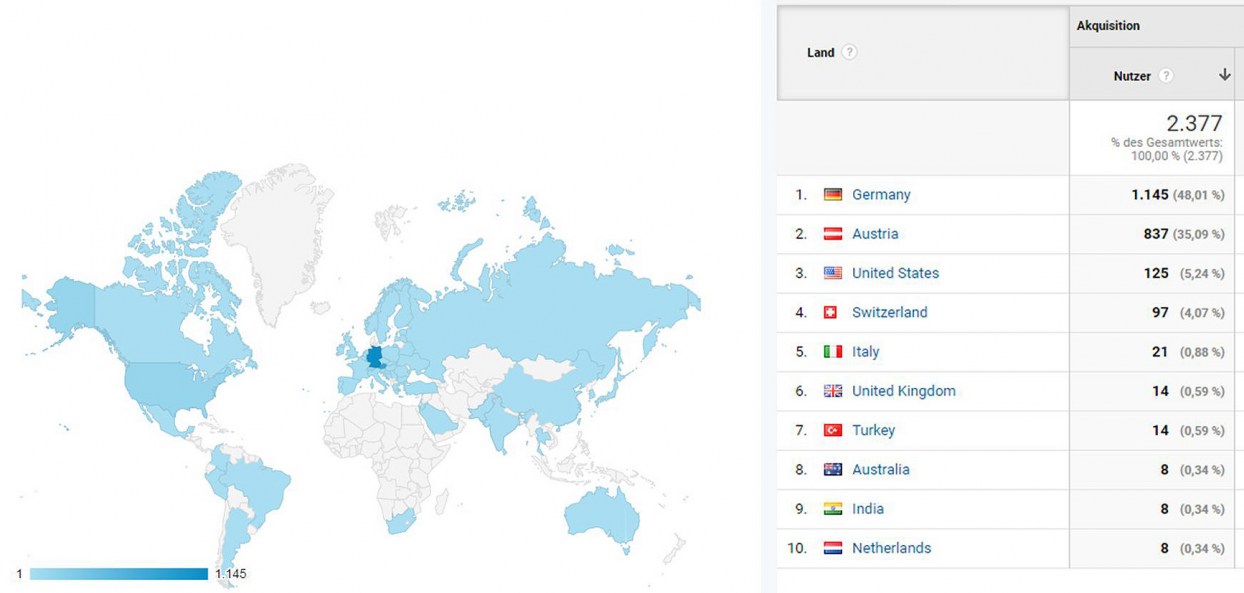Newsletter Research No. 17, February 2020
Dear colleagues and students,
As already announced in the last Newsletter Research and in the research meetings, the strategic orientation and structural reorganisation of VR Research has taken place: Each faculty has installed a Vice Dean in Research, who is responsible for the management of the SFU’s research agenda within his or her faculty. The Vice Deans are working together in a team with the Vice Rector Research.
Prof. Dr. Kurt Huber, Faculty of Medicine, has been awarded the title of Highly Cited Researcher in 2019, as in the years before since 2015, this time with SFU-Affiliation – Congratulations!
In this newsletter we are presenting a review of the Branch Meeting on 13.12.2019 with interesting contributions.
We expect remarkable results from the new research focus “Eco-Anxieties” by Prof. Dr. Bernd Rieken and Mag. Paolo Raile.
Furthermore, a short insight into the development of research at the psychotherapeutic outpatient clinics is given – the first publication has been published, the next one will be ready for submission soon.
We also report the current status of scientific publications in the ongoing academic year and the access statistics of our online journals in 2019 as well as two planned new series in the Research Bulletin.
We wish you a successful summer semester!
Univ.-Prof.in Dr.in Brigitte Sindelar | Vice Rector Research
Doris Krammer-Stehlik | Assistant to the Vice Rector Research
Februar 2020
1. Vice Rectorate Research – Structural Change
The progressive development of the SFU from a departmental university to a focus university increases and expands the demands on the management in the area of research. In order to meet these demands, each faculty has installed a Vice Dean in Research, who, in a team with the Vice Rector Research, is responsible for the management of the SFU’s research agenda within the faculty. Thus, a research management team is formed, which is responsible for the development and implementation of strategic research planning and quality management in research under the collegial leadership of the Vice Rector Research. The tasks of the Vice Deans for Research correspond to the tasks of a Vice Rector for Research at the faculty level, including all locations of their faculty, as defined in the constitution of the SFU and in the Rules of Procedure of the Rectorate,.
At the Faculty of Psychotherapy Science, Assoz Prof. Dr. Kathrin Mörtl will continue as Vice Dean for Research, same as Prof. Dr. Kurt Huber at the Faculty of Medicine. Ass.-Prof. Dr. Nora Ruck was appointed Vice Dean for Research at the Faculty of Psychology, Univ.-Prof. Dr. Konrad Lachmayer at the Faculty of Law.
2. Prof. Dr. Kurt Huber: 2019 again „highly cited researcher“
Prof. Dr. Kurt Huber, Vice Dean for Research at the Faculty of Medicine, has received the award “Highly Cited Researcher” in the field of “Clinical Medicine” according to Thomson&Reuters/Clarivate for the year 2019, as in the years since 2015. This time SFU MED is named as Affiliation. Only three experts in Austria have received this award in the field of “clinical medicine”, two of them from MUW, and Prof. Huber from SFU MED and KAV.
Prof. Huber’s publication output has a current Impact Factor (IF) of >4000 and a Hirsh (citation) factor according to Web-of-Science of 84. Since November 2019 Prof. Huber has been elected President of the Austrian Heart Fund. From March 2020 until 2022 he is elected “president-elect” of the Association for Acute Cardiovascular Care of the ESC (European Society of Cardiology), from 2022-2024 he will be its president.
We congratulate on these enormous scientific achievements!
3. Review of the Branch Meeting on 13.12.2019
Following the last Branch Meeting last December, I would like to give a short summary of the presented contributions:
Contributions:
– Research Cluster “Ressentiments”; Project “SFUrope”
Presented by: Dr.in Sara Paloni (sara.paloni@sfu.ac.at)
Attitudes and emotions of SFU students and academic staff in 5 European countries
SFUrope is a teaching research project on attitudes and emotions of SFU students and academic staff at all SFU locations and thus in five European countries. It is led by Prof. Dr. David Becker (SFU Berlin) and conducted by Dr.in Sara Paloni (SFU Vienna) with the support of the Institute of Statistics (Faculty of Psychology/SFU Vienna).
The project is divided into three phases:
Phase 1 consists of an online survey that examines the attitudes and emotions of students and research assistants of all faculties at all locations where the SFU is conducted with regard to three subject areas: (1) Europe, (2) National Identity and (3) SFU.
In Phase 2 the data will be transferred to all locations and will be processed and analysed quantitatively and qualitatively in the appropriate courses. The results will serve as an impulse for group discussions in theory and methodology courses and for further research projects at the locations.
In Phase 3 ten students from each SFU location (a total of 50 students) meet for three days in Friedensburg Schlaining (Burgenland/Austria) for an autumn school. Together they will present and discuss the research results and research processes. On the last day, students will have the opportunity to discuss these results with experts in history and peace studies.
SFUrope promotes the establishment of a transnational research network, helps to develop and discuss different methodological approaches and at the same time creates a pool of research data related to a crucial topic. SFUrope aims to facilitate a process in which SFU students and academic staff reflect together on Europe and the national-cultural contexts of their academic careers.
– Research Project: “Family Purpose in the 21st Century”
Presented by: Assoc Prof. Dr. Tarek el Sehity (Tarek.el-Sehity@sfu.ac.at)
The project team, consisting of the project leader Assoc Prof. Kendall Cotton Bronk, PhD (Claremont Graduate University), Assoc Prof. Dr. Tarek el Sehity (SFU Vienna), consultant Prof. Heinrich Liechtenstein, PhD, Prof. William Damon (Stanford University) and Prof. Anne Colby (Stanford University), is conducting an empirical study that examines the conditions under which family wealth develops and is passed on to future generations. The study explores which topics referring to family wealth are involved in the conversations within families, who addresses these issues, and what impact they have on family members. The project explores how these extremely wealthy families manage their resources in a socially beneficial manner, and how these families ensure their continued prosperity for future generations.
– Update on research projects in psychotherapy science
Presented by: Univ.-Prof. Dr. Brigitte Sindelar (brigitte.sindelar@sfu.ac.at)
Research focus: Mental health of children and adolescents: protective factors, resilience factors, vulnerability factors
In the years 2011 to 2017, more than 2700 children and adolescents received psychotherapeutic treatment at the psychotherapeutic outpatient clinics for children and adolescents of the Sigmund Freud University in Vienna. The most frequent reasons to visit the Clinic were learning problems and problems at school (more than 53 percent), social behaviour disorders (more than 50 percent), followed by anxiety (more than 28 percent), aggression (more than 23 percent) and depression (more than 20 percent), most of the children visiting the clinic for more than one reason. These figures underpin a fact: physical childhood diseases have lost their threat in the western world, and disorders of social, emotional and cognitive development have taken their place as “new childhood diseases”. In this research project, the available data material on emotional, social and cognitive development, such as pregnancy and birth, physical illnesses, separation or divorce of parents, physical and/or psychological illness of parents as well as data on early external care, migration, sibling position, educational level and professional situation of parents, and much more will be analysed. The aim of this comprehensive research project is to identify risk factors or factors promoting resilience for the mental health of children and adolescents, which allow conclusions to be drawn for preventive measures. One research topic in this priority area is devoted to early third-party-care and its impact on the mental health of children and adolescents. Two dissertations in the field of psychotherapy are included.
Within the framework of this research focus, the first publication was produced from outpatient clinic research:
In a quantitative analysis of the data, Mag. Maria Gren examined the extent to which migration can be identified as a predictor of mental disorders in children and adolescents. The publication appears in the journal Kairos (see also 5.).
Research focus: The psychotherapeutic process:
Problem areas of psychotherapeutic treatment: The threatening patient A quantitative empirical study on aggressive patient behaviour in individual psychotherapeutic settings.
With the collaboration of Mag. Carmen Auer
Using an online questionnaire, data from 625 psychotherapists were collected and analysed with regard to the influence of patient variables such as gender, age and diagnosis and the psychotherapist’s variables of age, gender, professional experience and psychotherapeutic method. The study has been completed, the publication is in preparation.
Research project: When the process fails – empirical study on therapy discontinuation
A first quantitative study of the psychotherapy discontinuation by the patient was conducted by MMag. Katharina Janowitz as part of her thesis for her degree in psychotherapy science. MMag.a Lisa Winter, deputy head of the psychotherapeutic outpatient clinic for adults at SFU, is now continuing the research on discontinuation of therapy in a qualitative research design. This research project is also a measure of quality assurance in the outpatient clinic.
– Research Project: iFEMPOWER: Interactive and mentorship based FEMale emPOWERment in the field of entrepreneurship
Presented by: Dr. Erzsebet Toth (erzsebet.toth@sfu.ac.at)
ifempower is a project co-funded by the Erasmus+ programme of the European Union with 9 partners from 7 European countries. ifempower aims to empower women to become selfemployed and entrepreneurs, especially in SMEs. Based on a preparatory research on the role of women in European SMEs, which examines the main roles, obstacles, gaps and market needs, the project will develop a module for university students that can help them to increase their knowledge on entrepreneurship issues by providing practical training to support their engagement in self-employment and entrepreneurship. This project started in September 2018 and will last 3 years. It is under the direction of the HÉTFA Research Institute Hungary.
– Research-Project: Theory, practice and consequences of operative psychology (FWF-funded)
Presented by: Ass.-Prof. Dr. Dr. Martin Wieser (martin.wieser@sfu-berlin.de)
This project illuminates the theory and practice of “operative psychology” in the GDR. Conceptual and theoretical roots, the professional development and practical application of psychological knowledge in personnel selection and training, the planning and execution of anti-capitalist propaganda and the methods of “decomposition” are analysed. The research project was submitted to the FWF in January 2019 and accepted in November 2019.
4. New Research Area in Psychotherapy Science: Eco Anxiety
Research project “Eco Anxiety” – fear of climate change. Psychotherapeutic and ethnological approaches Univ.-Prof. Mag. DDr. Bernd Rieken and Paolo Raile
This project investigates the so-called Eco-Anxieties with a special focus on the fear of climate change and its consequences. Within the framework of the project, a questionnaire will be developed which will be distributed at the university outpatient clinic of the Sigmund Freud University and by an online survey through various channels. In addition, qualitative interviews will be conducted and comments in online forums and social networks on climate change and people’s attitudes towards it will be investigated. The project was submitted for funding to the Austrian Climate and Energy Fund.
5. Research at psychotherapeutic outpatient clinics
Fortunately, the data documentation in the outpatient clinics has improved to such an extent that initial research work can be carried out:
Study: Migration background – potential risk for mental health of children?
Mag. a Maria Gren, BA. BA
The study examines the research question of the extent to which the biographical detail of migration background is important for the development of mental disorders in children and adolescents. To this end, the data routinely and systematically collected in the SFU’s psychotherapeutic outpatient clinics for children and adolescents from 2014 and 2018 were subjected to statistical analysis. The available data set of 3,222 child and adolescent patients includes 796 children and adolescents (3 to 17 years) with a migration background. The data set contains biographical and socio-demographic information as well as the diagnosis according to ICD 10. The author conducts a statistical analysis of the data, which leads to the result that migration background and also age at migration does not reach any significance as a predictor of mental disorders in children and adolescents. The article on this study by Mag. Maria Gren was accepted for publication in the journal KAIROS. (The psychotherapeutic journal “KAIROS” – Slovenska revija za psihoterapijo (SFU Ljubljana) was accepted for entrance in the international citation database Scopus in 2017.
All issues of KAIROS are open access at http://www.skzp.si/kairos/).
Research project: On the epidemiology of mental disorders: A quantitative empirical study
Univ. -Prof. Dr. Brigitte Sindelar, Jan Aden MSc., Florian Knasmüller, BSc., Mag. Manfred Reisinger
This research project is dedicated to an epidemiological question, conducted with data collected at the psychotherapeutic outpatient clinic for adults of the Sigmund Freud University over a period of nine years as part of the admission and registration procedure. The aim of the research project is to answer the question of whether the data can be used to identify typologies of people who seek psychotherapeutic treatment for mental disorders in
order to draw conclusions for mental health care measures.
The publication is in preparation.
The study will be presented at the 3rd meeting of the Koordinationsstelle Psychotherapieforschung1: „Psychotherapieforschung. Aktuelle Entwicklungen in Versorgung und Ausbildung“ ” on 16th October 2020 in Vienna.
6. Publications
6.1 SFU Research Bulletin: Access Statistics 2019
The access statistics of the Research Bulletin from 1.1.2019 to 31.12.2019 have shown: The site was accessed 9,319 times, with 3.06 pages visited per session. The average session duration was 2:19 minutes. The geographical distribution of the visitors:
6.2 Announcement: Series of articles in the Research Bulletin: Statistics in Psychotherapy Research
Jan Aden MSc and Anastasiya Bunina MSc, both Institute of Statistics of the Faculty of Psychology, are starting a new series of articles in the upcoming issue of the SFU Research Bulletin, covering the most important statistical methods used in quantitative psychotherapy
research. Each issue will describe a statistical procedure, with references to research practice being at the forefront of each article.
The articles aim to make the statistical procedures understandable even for “nonstatisticians” and thus more easily usable for own research.
The first article will deal with the appropriate application of the t-test for unrelated samples as well as the Welch and Man-Whitney-U-test.
(Jan Aden, Institute of Statistics, jan.aden@sfu.ac.at)
6.3 Announcement: new heading in the Research Bulletin:
UP! – Up and coming scientists
Editorial support: Dr. Sara Paloni, sara.paloni@sfu.ac.at
The SFU Research Bulletin opens a new section in autumn 2020: UP! UP AND COMING SCIENTISTS. Students and early stage researchers from all SFU faculties and locations are invited to publish their theses and research projects in this section in the form of a scientific article. In this way, first experiences can be gathered on what has to be considered when writing a scientific article – from an appropriate structure of the article to the process of peer reviewing.
6.4 Journal for Free Psychoanalytical Research and Individual Psychology: Access Statistics 2019:
The access statistics of the Journal for Free Psychoanalytical Research and Individual Psychology from 1.1.2019 to 31.12.2019 have shown: The site was accessed 10,833 times, with 2.9 pages visited per session. The average session duration was 2:08 minutes.
6.5.Status of publication output
The evaluation of the publication database for the current academic year (from 01.09.2019, status 22.2.2020) has produced the following results:
Number of publications by faculty:

7. Students‘ Research Award
The Students’ Research Award is presented each semester to five students who have made contributions to scientific conferences and congresses in the form of lectures or poster presentations or who have produced a scientific publication. The Research Award is rewarded with a reduction in tuition fees of € 500,- in the following semester. The Students’ Research Award is supervised by Dr.in Erzsebet Tóth and Mag.a Eva Wimmer. Submissions
from all faculties and locations are welcome ( (studentresearchaward@sfu.ac.at ).



